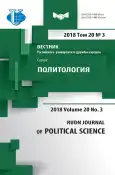THE PRESIDENCY INSTITUTION IN THE POST-SOVIET STATES: PECULIARITIES OF FUNCTION AND DEVELOPMENT TRENDS
- Autores: Gadzhiev K.A1
-
Afiliações:
- Russian Presidential Academy of National Economy and Public Administration
- Edição: Volume 20, Nº 3 (2018)
- Páginas: 427-435
- Seção: CURRENT PROBLEMS OF POLITICAL SCIENCE
- URL: https://medbiosci.ru/2313-1438/article/view/339993
- DOI: https://doi.org/10.22363/2313-1438-2018-20-3-427-435
- ID: 339993
Citar
Texto integral
Resumo
The presidency institution is of special importance to the majority of Post-Soviet States and plays a key role in their respective political arenas. At the same time, the existing institutional mechanisms of presidential power significantly differ from the "classic" world models which they were initially based on. This is true for the nature of the presidency institution and, to a greater degree, to the peculiarities of its function. Even though the institutional design of their political systems differs significantly, the presidential power in Post-Soviet countries functions in fairly similar ways. With that said, it appears necessary to identify patterns of development of the presidency institution in the Post-Soviet countries that developed over almost three decades. Pursuant thereto, this article attempts to analyze the dynamics of development of the presidency institution in these states, their respective peculiarities of function, the existing institutional mechanisms of interaction between the head of state and other public authorities, as well as its influence on the political system as a whole. The author looks at the presidential power not only from the formal-institutional perspective but also takes into account the most frequent informal practices.
Sobre autores
Khanlar Gadzhiev
Russian Presidential Academy of National Economy and Public Administration
Autor responsável pela correspondência
Email: gadzhiev_hanlar@mail.ru
PhD, Lecturer of Department of Political Science and Political Management of School of Public Policy, Russian Presidential Academy of National Economy and Public Administration
Prospect Vernadskogo, 84, bldg. 2, Moscow, Russian Federation, 119571Bibliografia
- Borisova N.V., Sulimov K.A. Vosproizvodstvo vlasti v sovremennoj Rossii: preemnichestvo kak invariant? [Power Succession in Contemporary Russia: preemnichestvo as an invariant?] Political science. 2012; 3: 105—124 (in Russ.).
- Gaman-Golutvina O.V. Avtoritarizm razvitiya ili avtoritarizm bez razvitiya: sud'by modernizacii na postsovetskom prostranstve [Authoritarianism of Development or Authoritarianism Without Development: the Fate of Modernization in the Post-Soviet Space]. The Journal of MGIMOUniversity. 2010; 4: 77—84 (in Russ.).
- Gel'man V.Ya. Institucional'noe stroitel'stvo i neformal'nye instituty v sovremennoj rossijskoj politike [Institutional Construction and Informal Institutions in Modern Russian Politics]. Polis. Political Studies. 2003; 4 (4): 6—25 (in Russ).
- Grishaeva O.N., Tolochko A.V. Obshchee i osobennoe v stanovlenii i razvitii instituta prezidentstva v postsovetskih gosudarstvah [General and Particular in the Formation and Development of Institute of Presidency in Post-Soviet States]. Post-Soviet Issues. 2016; 4 (10): 5—15 (in Russ.).
- Egorov V.G. Rezhimnaya transformaciya postsovetskih nezavisimyh gosudarstv [Regime Transformation of Post-Soviet Independent States]. International Relations. 2013; 4: 452—470 (in Russ.).
- Zaznaev O.I. Sverhprezidentskie sistemy na postsovetskom prostranstve [Super-Presidential Systems in the Post-Soviet Space]. Proceedings of Kazan University. Humanities Series. 2008; 150 (7): 16—30 (in Russ.).
- Zmievskii D.V. Konstitucionno-pravovye preobrazovaniya v gosudarstvah postsovetskogo prostranstva: ponyatie, sushchnost', predposylki i formy [Constitutionally-legal Transformations to the Post-Soviet Territory States: Concept, Essence, Preconditions and Forms]. Fundamental and applied researches of the cooperative sector of the economy. 2012; 2: 144—152 (in Russ.).
- Zmievskii D.V. Konstitucionnye principy osushchestvleniya gosudarstvennoj vlasti v stranah postsovetskogo prostranstva [The Constitutional Principles of Realization of the Government in the Post-Soviet Territory Countries]. Fundamental and applied researches of the cooperative sector of the economy. 2012; 3: 165—174 (in Russ.).
- Kuvaldin V.B. Prezidentskaya i parlamentskaya respubliki kak formy demokraticheskogo tranzita. Rossijskij i ukrainskij opyt v mirovom kontekste [Presidential and Parlamentary Republics as Forms of Democratic Transit (Russian and Ukrainian Experience in the Global Context)]. Polis. Political Studies. 1998; 5: 134—138 (in Russ.).
- Makarkin A. Postsovetskoe prostranstvo: Avtoritarizm i kompromissy [Post-Soviet Space: Authoritarianism and Trade-offs]. Neprikosnovennyi zapas. 2011; 6 (in Russ.).
- Panov P.V. Politicheskij poryadok i problema vosproizvodstva vlasti: institut preemnika [Political Order and the Problem of Reproduction of Power: the Institute of Successor]. Political Expertise: POLITEX. 2010; 6 (3): 19—33 (in Russ.).
- Panov P.V., Sulimov K.A. Smena lidera i predely personalistskogo prezidencializma: perspektivy varianta «preemnik» v stranah Zakavkaz'ya i Central'noj Azii [Leadership Succession and Limits of Personalist Presidentialism: The Perspectives of “Preemniks” in the Caucasus and Central Asia]. Political science. 2014; 1: 134—158 (in Russ.).
- Parechina S.G. Institut prezidentstva: istoriya i sovremennost' [The Presidency Institution: History and Modernity]. Matusevich E.V., editor. Mn.: ISPI, 2003 (in Russ.).
- Podvintsev O.B. Partijnye sistemy byvshih soyuznyh respublik kak otrazhenie raznonapravlennyh tendencij razvitiya postsovetskogo prostranstva [The Party-systems of the Former Soviet Republics as a Reflection of Divergent Development Trends in the Post-Soviet Space]. Russia and the contemporary world. 2008; 3 (60): 168—174 (in Russ.).
- Ustimenko S.V., Ivanov A.F. “Partiya vlasti” v sovremennoj Rossii: retrospektiva i perspektiva [“Party of Power” in Modern Russia: a Retrospective and Perspective]. The Power. 2003; 8: 6—12 (in Russ.).
- Shtol' V.V. Postsovetskie gosudarstva: poiski samoidentifikacii i izderzhki nezavisimosti [PostSoviet States: Quest for Identity and Costs of Independence]. Obozrevatel' — Observer. 2012; 12 (275): 29—41 (in Russ.).
Arquivos suplementares









